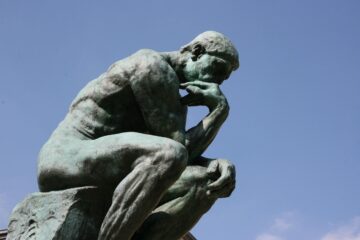Politicians—I know, I was one once—are particularly gifted at identifying self-interests. They do it all the time. It should come as no surprise to note that with every vote, legislators wonder, occasionally in public but mostly in private, “how will the people respond to the vote I just made?”
It’s a selfish perspective for sure. Self-preservation. As selfish, I think, as that of cave dwellers wondering whether they will have breakfast that day or be breakfast to the elements that live just beyond the dark opening of their stone-walled redoubt. It’s a natural thing politicians do to survive. It’s unsavory to those of us—I can say that now—who look on skeptically as politicians feign sincerity in casting a tough vote, when we know they are actually calculating whether they will be reelected after supporting something unpopular. The worry is always there, even in small things. In that regard, politicians driven by self-interest are more like cave dwellers than statesmen. But are they any different from any of us? Probably not. Lurking in all of them—as in us—is the ability to demonstrate statesman-like behavior if they embrace some simple leadership lessons.
Lately, I have been encouraged to write about the lack of statesmanship in America. That made me wonder, what is a “statesman?” Strictly speaking, the word defines one who is “versed in the principles or art of government” or is “a wise, skillful, and respected political leader.” Seen many of those lately? I suspect that this definition is suitable, but personally it’s not sufficient. For me, statesmanship is doing the right thing in the affairs of government, when no one is looking, when your concern is centered on the greater good, not on the greater self-good.
In that respect, statesmanship is more than a glorious quality assigned to people who have survived political careers and—for better or worse—have been wise, skillful, or respected, the latter more a matter of political perspective by the beholder than the actual character of the beheld. Statesmanship is leadership in the purest sense of the word. Indeed the characteristics of a statesman are the same as those of successful leaders in all walks of life. But if we consider just politics for a moment, what marks a statesman?
First, American statesmen revere and are devoted to the Constitution, the supreme law of our nation. No one can be a statesman who is not a constitutionalist. But there are other virtues evident in a statesman in my judgment that are also present in great leaders.
Second, great statesmen listen. I learned as a legislator that regardless of your predisposition to a bill being debated, listen to the debate. You will likely hear something that you did not know.
Third, acknowledge competing arguments of those around you, even if you disagree with the tone and content of their points. It’s a virtue to respect free speech, even speech that you find objectionable. Yet real leaders are patient and hear out the opposition before they respond, hopefully with wiser counsel.
Fourth, statesmen “keep their powder dry” as they extend the patience of listening to patience in responding. To be sure, you have to be decisive in urgent matters, but I have found in life and leadership that sometimes waiting for things to develop and jell a bit provides the time to appropriately react. Put another way, statesmen are cool under fire, and never let anyone “see them sweat.”
Fifth, statesmen seek compromise. Wisdom requires it. In leadership, you can assume a “my way or the highway” posture in moving an agenda, but in time such arrogance results in being told to “hit the road.” Moreover, compromise does not mean jettisoning one’s principles, but rather recognizing success when it occurs. For President Ronald Reagan, that meant embracing an 80 percent solution and fight for the remaining 20 percent later.
Sixth, statesmen shift credit to others, even when doing so is simply a generous act. In that regard, statemen seek to build team play and that includes acknowledging the modest contribution of another in a fulsome manner. Doing so not only provides a good example, but it conditions people to the habit of making compromises when they are appropriate.
Finally, statesmen see things as they are, not as they wish them to be. Statesmen take reality and fashion it into something better through their sincere and unselfish efforts. The point should be clear. Statesmanship is leadership. So the problem is not the lack of statesmen as much as it is the lack of leaders at a time when we desperately need them to do the hard work of governance.
I wish I had recognized all of this when I was a legislator. At least it’s not too late to write about it.
PS: The 14th of June, the Birthday of the U.S. Army, is this coming Monday!. What a great time to read about our Army! Celebrate it by getting a copy of my book Desert Redleg: Artillery Warfare in the First Gulf War. You can acquire a copy from major outlets now or, if you want a signed hardback copy, visit Shop on my website and order one directly from me, autographed and personalized as you desire. Happy Birthday U.S. Army!



0 Comments